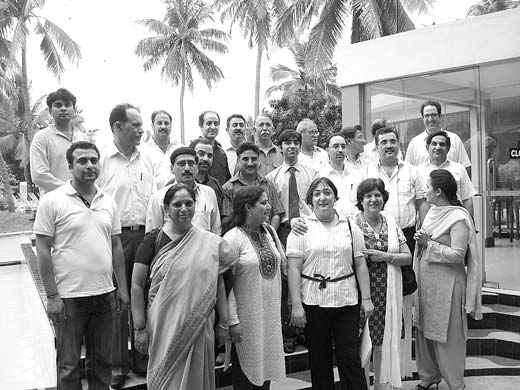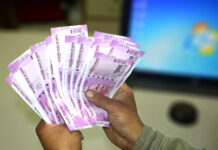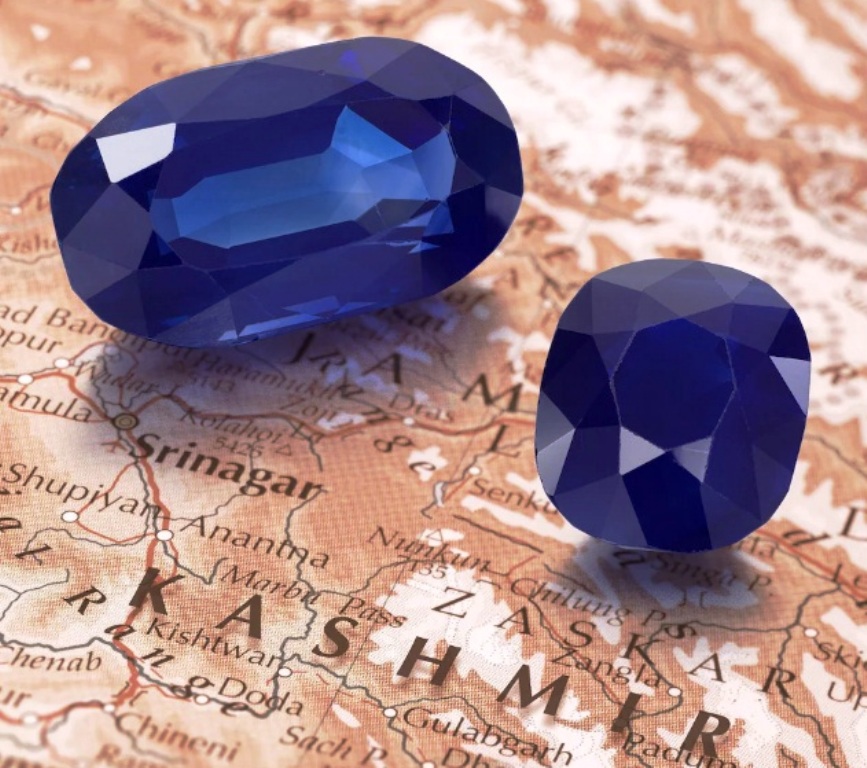As the confrontation between the government and its employees slumps trade and makes people suffer, Kashmir Life analyses whether a solution to the crisis can solve the inherent problems of the system as well.

After 17 months of barter and mounting trade balance, New Delhi has finally moved a proposal to manage the banking crisis in the trans-LoC trade. Fully aware of the sensitivities associated with involving any international currency like Dollar or Euro or even the Asian Currency Unit (ACU) in Kashmir, New Delhi is suggesting Islamabad that their main banks will have to open vostro accounts of each other’s currencies and sell them respectively at fixed rates to prevent exchange risks.
The trans-LoC trade is unique – it is neither domestic trade nor international trade. Banking and currency issues are closely linked. India and Pakistan lack any credible banking relations and the entire trade they are doing currently takes place through third country banks.
Initially the J&K Bank had suggested that it be permitted to revive its two branches that closed after the LoC forced a division of the erstwhile state of Jammu and Kashmir. A proposal to this effect is still with New Delhi. The plan was informally discussed with a top financial expert of Pakistan who had earlier held vital positions in Islamabad. At a later stage, it was informally conveyed from Srinagar that J&K Bank would be willing to even take over the entire network of the Bank of Azad Jammu & Kashmir (net profit of seven crore Pakistani rupees in 2009) that is operational since 2005. There was no forward movement on any of the proposals.
On the currency front, trade in Srinagar was against the idea of resorting to any trade that can have impact on the disputed status of the region. They said in explicit terms at the start of the trade that using international currencies like Dollar, Euro, Pound Sterling or even the Asian Currency Unit (ACU) will, in the long term, become much akin to international trade in which category the trans-LoC trade does not fall. A proposal was sought from Srinagar and the blueprint was discussed in detail before being put before the Cabinet Committee on Security (CCS) for formal approval last week.
The proposal envisages the Reserve Bank of India and State Bank of Pakistan to enter into an agreement that fixes the rates for the two currencies for a specific period and prevent an exchange risk to the traders. Once it is over, an Indian bank will hold (vostro) account of a Pakistani bank in Pakistani currency and a Pakistan bank an Indian bank’s (vostro) account in Indian currency. This will end the crisis of the trans-LoC trade as for as banking and exchanges are concerned. New Delhi is mulling to send the proposal to Islamabad so that an agreement can be reached.
By the end of January, the government informed the state legislature that the two sides in Uri (Kashmir) and Chakan da Bagh (Poonch) have registered a business turnover of Rs 264 crore. This was despite the trade being limited to five hours, twice a week and the windows getting closed after protests over disputes or climatic reasons. From two points J&K exported material worth Rs 105.41 crore and imported worth Rs 158.50 crore. Given the variation in currencies, it might be almost equal.
Apart from seeking extension of the two days trade to four days a week, J&K government is managing investment of Rs 75 crore to create additional infrastructure. Industries Minister Surjit Salathia recently told the legislature that under ASIDE they have sought Rs 40.27 crore for TFC Salamabad and another Rs 35.33 crore for TFC Chakkan da Bagh. The centre has also permitted five telephone lines that traders would use to talk to people across.
But the snail paced developments are unable to address the larger concerns that the stake-holders and international watchdogs observing the conduct of trans-LoC trade are raking up. Reopening of the pre-partition routes for trade and movement of the people on two sides of the divide in J&K is obviously the major initiative of significance that India and Pakistan have taken since 1947. But the problems have reduced the barter to mere symbolism as it has neither emerged as a major trade nor is capable of supplementing the ‘peace constituency’, they believe.
In Colombo, last week, a Western NGO flew “stakeholders” and “experts” from New Delhi, Srinagar, Jammu, Muzaffarabad, Mirpur, Gilgit and Islamabad for a “structured” discussion for three days. Though Kashmir, the principal stake holder in the entire process and the epicentre of all developments in the region was unfairly under-represented, it offered a ringside view of the developments on this count especially about the PaK.
Zulfikar Abbasi, president joint chamber of commerce of the erstwhile J&K says, “It (trade) is a movement in Azad Kashmir…The police is using even force to quell protests of the traders who wish to trade but there is a capacity problem as authorities cannot permit trucks from any of the two roads beyond 25 in a single day of trade.” Right now there are 6000 registered traders with the authorities and many more are undergoing the process of registration. There are hundreds of such registered traders who are yet to get their first turn to send their truck to this side, he added.
Massive response and limited opportunities has forced Muzaffarabad government to enforce a stringent system of registration. “Any person who wishes to be a trader has to submit a bank guarantee of Rs 20 lakh, Rs two lakh as refundable deposit and one lakh rupees deposit for each item he intends to trade in,” said Tariq Ahmad Wani, one of the senior trans-LoC traders in Muzaffarabad. Once the trader gets a chance to send a truck, he has to pay Rs 3500 for every 1.5 ton truck load as scanning fee. Like J&K, both the openings on the other side of the LoC lack truck scanners making scanning of the items a manual process.
These restrictive measures, said Waleed Rasool, a Kashmiri pursuing his PhD and ‘peace activism’ besides trade, had actually killed the initiative at one point of time. “It was (saved only) when Kashmiris living in PaK intervened,” he said, adding “right now there are 500 Muzaffarabad based Kashmiris living in PaK who are trans-LoC traders and they are sustaining it because they have relations on this side.”
There were victims of trade as well – some suffering because of the absence of dispute resolution mechanism and some who suffered losses. Take the case of Kaashan Masood, a trader who knew the food deficit of Kashmir and was the first to supply it from across the LoC. “My name came at the last moment and within a night I had to arrange a huge consignment. My suppliers in (Rawal)Pindi showed me a variety and it was alright but when he supplied he had mixed two varieties,” Masood said. “In Srinagar it turned out to be costly and sub-standard and I suffered a loss of Rs 13 lakhs,” he said. He had taken a sack home but could not eat it himself.
Experts from either side of the line were categorical in saying that the nascent initiative creating a peace constituency that eventually will overtake the political issues is impossible. They in fact linked progress of the political part with the continuation of the trade. “Do not over-estimate the trade,” cautioned Dr Sidiq Wahid. “The trade cannot substitute the other initiatives for conflict resolution,” added Dr Rekha Choudhary, a political scientist from Jammu. Ms Ayeesha Saeed from Pakistan said the trade has become the very first initiative in which the people see themselves to be actors, a feeling that must get strengthened. Arif Kamal, a former ambassador and peace activist said the trade can’t always be kept on artificial respiratory mechanism.
Instead of seeking an emphasis on increasing the trade volumes, reducing the security issues and making the entire process much liberal, a number of participants were of the view that the two sides should get the benefit of doubt for some more time given the animosity and level of suspicion they have been living in for six decades. They in fact identified some of the forces that could prove detrimental to the nascent initiative if the stakeholders and the policy makers are ignoring the larger connected realities. Apart from hawks in the political establishments on the two sides of the Radcliffe divide, they said rival bureaucracies with security mindset, trade bodies of the two countries (mainland) and the Kashmir leadership could hit at it if and when they see the trade as a problem. “The best way is to have all of them on board,” one participant suggested.
The impressive argument was made by a young Pakistani Moeed Yusuf, a researcher with the Harvard’s Kennedy School and currently associated with USIP and Suba Chandran, currently with the IPCS. They said the current volumes of trade are no threat to either side. They said the two sides are capable of plugging once it reaches a threshold. So, for survival the trade has to become viable. ‘Kashmir origin’ manufactures and produce, they asserted will never make it viable as there is no clear research and study that would justify the argument.
And the ground realities seem to be vindicating them. Apple is Kashmir’s main produce but it has no market in PaK or in Pakistan. Kashmir is short of rice but any imports from PaK will be costly. Handicrafts will have a very small market in PaK. In 17 months, only 60 grams of famed Saffron could go to other side besides 2500 grams of dried vegetables, 12 small carpets and 46 wall hangings. The larger issue is that Muzaffarabad has no item of its own that it would trade in. Once, said Waleed, we had a demand for apricots and we approached Gilgit-Baltistan but they refused. “They said they are getting better prices from China and Europe and would not supply at low costs,” he said adding the order was cancelled.
Currently the trade is being carried out mostly in non-local products. At one stage it was garlic coming from PaK and onions going from J&K. Now it is green gram (Moong Daal) coming and coconuts going. Demand for the green gram is so huge that it has skyrocketed the prices of the commodity in Pakistan from Rs 25 last year to Rs 80 now making it impossible for locals to consume it.
Even the trade is with non locals. Local traders are functioning as surrogates of business houses in Delhi, Amritsar and Islamabad. “I was approached by many people asking me if I could lend my name for the trade but I said I can not do this,” said Abbasi.
The only way out, says Moeed is transit trade. But are the two sides ready?














